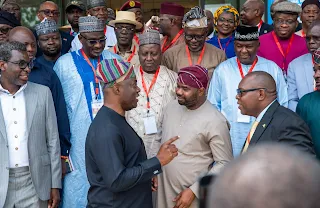Oyo State Governor, Engr. Seyi Makinde, the Chairman of the Federal Inland Revenue Service (FIRS), Zacch Adedeji, and other critical stakeholders have emphasized the need for a more humane and inclusive approach to taxing Nigeria’s vast informal sector.
The call was made at the 157th meeting of the Joint Tax Board (JTB) held in Ibadan, the capital city of Oyo state on Monday, May 26.
The two-day meeting, which was themed “Taxation of the Informal Sector: Potentials and Challenges”. brought together top tax administrators, policy influencers, and key stakeholders from across the country to address the pressing issue of integrating the informal sector into Nigeria’s tax framework to enable effective economic planning.
Governor Makinde, while delivering his address, appealed for empathy and strategic support in the effort to widen Nigeria’s tax base.
He said government must be strategic but also humane in its approach stressing that the goal should not only be to increase revenue but to support and empower those within the informal economy so they can thrive and contribute meaningfully.
Makinde also reiterated his administration’s commitment to balancing fiscal responsibility with inclusive economic growth while highlighting the significance of the state’s recent initiatives that have improved on its revenue generation drive.
Earlier in his welcome address, FIRS Chairman who also doubles as the JTB Chairman, Zacch Adedeji, acknowledged Oyo State’s pioneering role in national development and tax administration.
He noted that the informal sector accounts for 92.6 percent of Nigeria’s employed population, according to the National Bureau of Statistics (NBS), emphasizing the sector’s critical importance in Nigeria’s economic structure.
Adedeji stated that the JTB, currently transitioning to the Joint Revenue Board (JRB) with expanded scope and responsibilities, would continue to harmonize and modernize tax systems nationwide.
“Our meeting here provides the right platform to brainstorm innovative and equitable ways of bringing the informal sector into the tax net without alienating or overburdening it,” Adedeji noted.
While stressing that the administration of President Bola Tinubu is concerned about the well-being of operators of the informal sector noting that the ongoing efforts to capture these players into the taxable net is to properly organize the sector for effective economic planning and not to tax them.
Similarly, Mr. Femi Awakan, Executive Chairman of the Oyo State Internal Revenue Service, who also spoke on the state’s tax reforms and challenges reported that Oyo state’s IGR has grown from N1.6 billion per month in 2019 to about N8.5 billion per month in Q1 2025, which according to him marked a 240% increase over the same quarter in 2021.
Despite these gains, Awakan highlighted key challenges affecting tax administration, including inadequate public investment, limited institutional autonomy, technological gaps, and poor tax culture.
He called for greater financial and operational independence for revenue services and investments in data-driven and technology-enabled tax systems.
“We must reach the unreached, capture the untouched and tax the sector once considered negligible,” Awakan said. “But we must also ask: How do we do this without stirring the hornet’s nest or being tagged anti-masses?”
Addressing newsmen at the event, Executive Secretary of the JTB, Olusegun Adesokan, assured that stakeholders will exhaustively brainstorm and come up with a resolutions that will form a robust template that will enhance the nation’s economy.


Post a Comment
Drop Your Comment In The Box Below